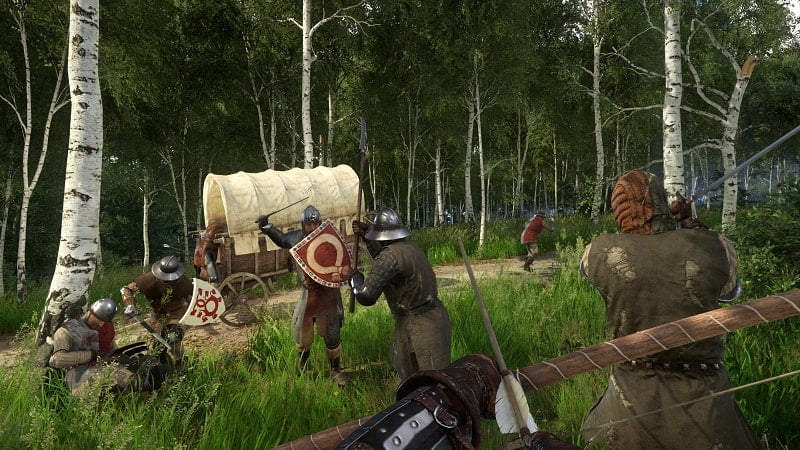A scandal in Bohemia: the year 1403 sees the waning king Wenceslas, sluggard son of the lionised Charles IV, kidnapped by his half-brother Sigismund of Luxembourg. Political sharp practice under the guise of realm restoration, Sigismund takes the opportunity to unify the land under firm rule – his own – by way of pillaging one town after another.
One such town is Skalitz, home to our roustabout hero Henry, the son of a blacksmith. His is a carefree life spent perambulating about amidst his NPC neighbours, drinking mead, pulling pranks with his friends, and fetching supplies for his father’s forge – and so it falls to you. After an hour of workaday chores you’ll feel a wash of relief as the pillaging party arrives.
Kingdom Come: Deliverance takes its time, then, but its reward is rich if you can steel yourself for a drawn-out prologue. In defence of developer Warhorse Studios, there is a lot to set up, as theirs is a mission of historical accuracy.
Beginning life on Kickstarter in 2014, Kingdom Come shuns what its pitch page describes as the “half-naked Elven warriors” that so often throng this kind of game. Instead, it tells a tale of economic tension, palace intrigue, and ordinary struggle.
Its written by Daniel Vávra, who wrote the first two Mafia games, and it’s a tale that veers away from its opening cliché as fast as you wish the opening itself would. It’s a beguiling tale of sons and fathers, one that actually lives up to its wishy-washy subtitle. Vávra’s writing is twinned with your own, a legion of options allowing you to pen a chivalric romance with Henry your knight-errant, or a rogue’s tale with a drunken lech at its heart.

Exchanges can be won; people can be strong-armed; prices can be bartered down; and all can be bypassed with your wits, nimble fingers, or some coin, with most guards and citizens proving venal. In fact, if your code of honour slinks to the gutter then there are all sorts of unscrupulous ways to make money – from grave-robbing to thieving and gambling – and there are plenty of ways to spend your pelf. Apothecaries, tailors, blacksmiths, taverns, weaponsmiths, archery ranges, scribes: all dot the world for your indulgence if you have the Groschen.
And what a world it is. Warhorse Studios has used Crytek’s engine and despite some chafing it’s an arresting place to be. At around 3.5 square miles, it’s no mere CryEngine maquette. It’s a curated land of quiet beauty: dewy forests pin-cushioned with morning light, village tracks spattered with manure, rolling hills and fields wending to deferential castles and bustling towns. It’s the sort of place that was enough when you were young – the sort of place that reminds us of the ordinary magic of the middle-ages: a time when gates were heaved opened with chains and messages were sent clasped to talons.
It’s a refreshing approach in an under-stocked genre. Outside of RTS games, the medieval adventure rarely plays it straight. The absence of magic hardly means a lack of complexity, however. A litany of bars and numbers determine everything from your likelihood of winning a verbal exchange, to a bar brawl, to whether you can pick a lock or do bladed battle with a foe.
The latter is ambitious, but holds together for those with enough patience – a recurring theme. Movement has an airy bob to it, as Henry’s limbs pendulum past the camera with each swing of the sword. Parries and ripostes make their entrance early on and prove vital to victory, but it’s necessary to stick to the main quest – where you’re given a sword and sufficient training – until you’re spat out able to outspat your adversaries.

Absent any kind of cross-hair, archery takes getting the hang of; often you’ll fire a test arrow and adjust accordingly with Henry’s breathing and natural sway. Hitting something on first attempt scores a rush of endorphins to trump any possible in-game reward.
The most cherished of which is often a simple save. With erratic auto-saves sometimes over an hour apart, it leaves you on edge if you planned a shorter sitting. Manual saves come by way of Saviour Schnapps, an alcoholic drink which is very expensive to buy and very time-consuming to brew – providing you have the requisite alchemy skills.
The compressed nooks you find in most games are unwound here, with things like alchemy and smithing carried off without abstraction. You’ll be sharpening your sword by angling it against the grindstone; you’ll be brewing up your potions by stamping the bellows and fanning the flames. A lot of these activities require the ability to read – an expensive skill to acquire, tasking you with seeking out a scribe and honing with practice.
Fortunately, these gears are greased naturally, in that you level up by doing, which suits a game like this – scrapping skill-trees for an organic progression that rewards you for playing the way you want.
As if the odds weren’t stacked against you enough in Henry’s mission to foil Sigismund, you’ll have to do battle with horde of technical problems. Playing on a standard PS4, it’s bemired in a shaky frame rate (capped at 30fps) and often late-to-the-party textures. The 23GB(!) day one patch seems something of a nostrum at this point – or else what was it like without? NPCs have a pallid look to them, topped with Play-Doh hair and glassy eyes; it isn’t ruinous but it is a shame, especially up against the beauty of the surrounds.
Loading times are lengthy and often, and bookended with black screens; cut scenes are spliced with inexplicable cutaways and people facing the wrong way; and you might just find yourself dissolving through a wall here and there – the supernatural hasn’t been completely banished after all! These are things that, with genre giants like Skyrim and Fallout, have come to be expected – if not forgiven.

The Kickstarter hit all but one of its stretch goals: an extra 200,000 would have afforded Warhorse “better voiceovers.” With Deep Silver picking up publishing duties in late 2016, it clearly wasn’t too high a priority, swinging wildly in quality from A-level drama student to (literally) Brian Blessed. There’s often a hypnotic pull to bad voice acting; here it bears an independent spirit that will make you smile.
In the spirit of smiling, the codex will make the hearts of history buffs soar with detailed entries on everything from beekeeping, to the decorations adorning church walls, to animal husbandry. It’s a Byzantine volume which you can flip open with a single button at each new sight, evincing Warhorse’s gushing enthusiasm for the period.
The way you’re shown the ropes is, for better or worse, tabulated there as well. The wealth of information proffered in every menu, the guides that spring forth detailing the intricacies of potions, trading, and etiquette, means you aren’t taught so much as given a musty 15th century guidebook and sent off to private study.
The reward for doing so is an enormous sense of freedom, the game refusing to bring the gavel down no matter your approach. Each victory has the sweetness of fruit won from labour, from understanding; it’s a game that must be wrangled into submission. Perhaps it shouldn’t come as a surprise, given its crowd-funded origin, that it’s one that requires your investment. If you give it that, then despite some very rough edges, this one delivers.
Game: Kingdom Come: Deliverance
Platform: PS4, Xbox One, PC
Developer: Warhorse Studios
Publisher: Deep Silver
Release Date: Out Now






